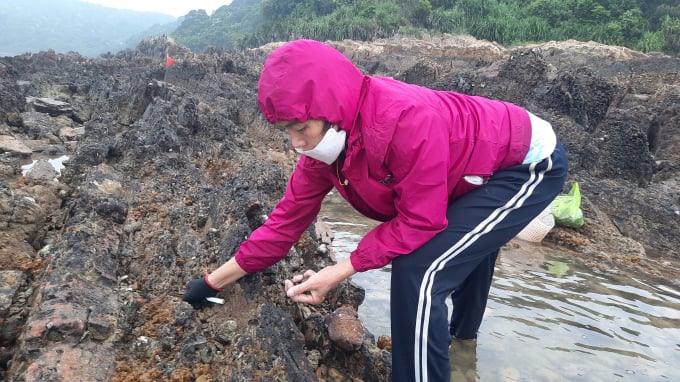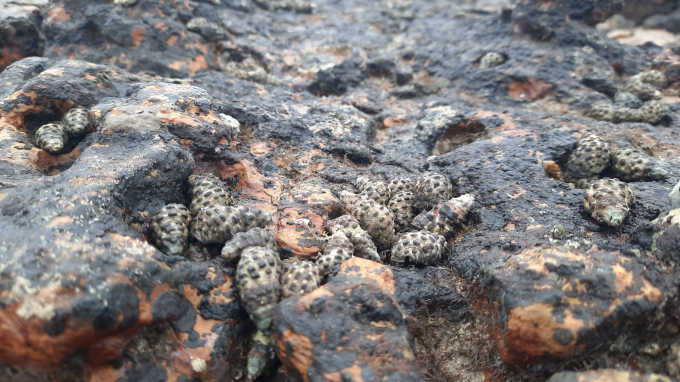June 21, 2025 | 02:23 GMT +7
June 21, 2025 | 02:23 GMT +7
Hotline: 0913.378.918
June 21, 2025 | 02:23 GMT +7
Hotline: 0913.378.918

Some households is currently living on raising stone snails on small islands in Co To district. Photo: Nguyen Thanh.
Located in the northeast of Quang Ninh, Co To is an island district with over 50 islands of various sizes. This area within Co To - Tran Island has been evaluated by experts as an area with a high level of biodiversity in the Northeast.
Co To district has beenn observed to have a very unique ecosystem, including coral reef ecosystems, tidal zones, long and beautiful sandy beaches, mangroves, tropical forests on the island, soft-benthic ecosystems, and so on.
The area also boasts a high level of species diversity with nearly 1,000 aquatic species, the majority of which are phytoplankton, large benthic animals, marine fish and corals.
However, due to the impacts of economic and human activities, the marine resources and environment in the Co To and Tran islands are suffering heavy damages.
According to statistics, Co To welcomes an average of 150,000 to 250,000 visitors a year; and tourism was at its peak in 2017 when Co To welcomed 320,000 visitors. The sharp increase in the number of tourists has caused fishermen to focus on exploiting to the point of exterminating all kinds of seafood.
Most notably, the coral reef ecosystem has suffered extensive damage with 90% of its coverage and distribution range destroyed, and many of the reefs are dead. As a result, Co To has been recorded as an area with the fastest and most destroyed coral reef among the coastal regions of Vietnam.
The coral species composition in Co To is currently very few and monotonous with only 25 species remaining, including 24 species of hard coral and 1 species of soft coral. This level of destruction was brought about by overexploitation of fish using explosives over an extended period of time.
In order to ensure the sustainability of the sea and natural marine economic sectors, the establishment of marine reserve areas has been regarded as an effective tool both domestically and globally.
Effectively managed marine reserve areas will meet multi-purpose development needs as well as bring benefits to local communities and people, contributing to the sustainable development of the national marine economy, with the primary focus being marine biodiversity and fisheries.
The country has established and put 11/16 marine reserve areas into operation. With an unique marine ecosystems, Co To and Tran Island are home to many high-value aquatic species. Subsequently, Co To and Tran Island are among 16 planned marine areas under the national marine reserve system with priority on the establishment of marine reserve areas.

Some marine species in Co To island district are in danger of extinction due to overexploitation. Photo: Nguyen Thanh.
Quang Ninh Provincial People's Committee approved the detailed planning of Co To - Tran island Marine Reserve Area in June 2020. According to the planning, the marine reserve area will include two partitions, Co To and Tran island, located within the administrative boundaries of Dong Tien, Thanh Lan and Co To townships. The total planned boundary area is over 18,414ha and the size of reserve area is 13,230ha; the buffer zone area is 5,184 ha.
The project to promote the recognition of Co To - Tran island Marine Reserve Area has been officially launched by the Rockefeller Foundation through the Oceans5 program specializing in the protection of the oceans. The project is managed by the Centre for Marinelife Conservation and Community Development (MCD) in collaboration with the Quang Ninh Department of Agriculture and Rural Development.
In addition, this marine reserve area plays a role in improving the livelihoods of communities and fishermen living in or near the reserve; it will also contribute to community education, entertainment and eco-tourism in association with fisheries development. Additionally, the reserve aims to solve transboundary environmental problems in the waters of the Gulf of Tonkin.
It is expected that from 2022 to 2025, Co To - Tran Island Marine Reserve Area will focus on specific goals, such as conserving important, key and natural ecosystems (coral reefs, mangrove forests); restore and regenerate natural and artificial coral reef ecosystems in degraded areas; protect, restore and develop populations of rare and valuable marine species (slugs, tortoises, leatherback turtles, white dolphins, finless dolphins).
Quang Ninh Department of Agriculture and Rural Development and MCD has coordinated with Co To district to organize a dialogue with its locals. Mr. Pham Ngoc Son in zone 4, Co To town shared that he has been a fisherman for a long time, he has now switched to raising stone snails on small island. "If the province establishes a marine reserve area, I will fully support it, however, I also wish to be supported with a stable job as well as a source of income to support my family", said Mr. Son.
Mr. Do Dinh Minh, Director of the Sub-Department of Fisheries under Quang Ninh Department of Agriculture and Rural Development, shared that the establishment of Co To - Tran Island Marine Reserve Area is an urgent task in the current period which has great significance in the socio-economic development in addition to national defense and security of the province.
“We also need to make it clear that the establishment of Co To - Tran Island Marine Reserve Area is not a destination, but a starting point for a journey. Therefore, when Quang Ninh decided to establish the reserve, the province and related units strengthened the network of reserve areas in Vietnam and enhanced communication to attract active and strong participation from relevant agencies, organizations, experts and the community in the construction and operation of marine reserve areas", emphasized Mr. Minh.
According to the Law on Fisheries No. 18/2017/QH14 dated November 21, 2017 and other legal documents: A marine reserve area is a type of natural reserve established at sea (including including sea water masses and seabed), on the mainland of islands, archipelagos and coastal areas to protect marine biodiversity.
Translated by Nguyen Hai Long
![Turning wind and rain into action: [9] Digitizing hydrometeorological data in response to climate change](https://t.ex-cdn.com/nongnghiepmoitruong.vn/608w/files/news/2025/06/17/z6704423696987_15fd32ffc26d590d204d520c9dac6786-nongnghiep-165943.jpg)
(VAN) Farmers have begun accessing hydrometeorological applications to adjust their cropping schedules, aiming to ensure productivity and adapt to climate change.
![Turning wind and rain into action: [8] Real-time salinity detection and early warning technology](https://t.ex-cdn.com/nongnghiepmoitruong.vn/608w/files/news/2025/06/17/z6704423696987_15fd32ffc26d590d204d520c9dac6786-nongnghiep-151127.jpg)
(VAN) Thanks to the integration of modern hydrological-hydraulic models, remote sensing technologies, and artificial intelligence, the accuracy of hydrological forecasting has significantly improved.
![Turning wind and rain into action: [7] Early disaster warnings help marine farmers minimize losses](https://t.ex-cdn.com/nongnghiepmoitruong.vn/608w/files/news/2025/06/17/z6704423696987_15fd32ffc26d590d204d520c9dac6786-nongnghiep-142942.jpg)
(VAN) In recent years, thanks to early disaster warnings and forecasting, marine farmers in Khanh Hoa province have been able to reduce risks and losses, thereby improving production efficiency.
![Turning wind and rain into action: [6] ‘Four on-the-spot’ disaster management software](https://t.ex-cdn.com/nongnghiepmoitruong.vn/608w/files/news/2025/06/17/e5a48259d6a262fc3bb3-nongnghiep-183800.jpg)
(VAN) By simply activating the scenario on the disaster management software, the relevant authorities immediately know how many households need to be evacuated, where to evacuate them to, and by what means of transportation…
![Turning wind and rain into action: [5] Hue applies modern technology in disaster forecasting](https://t.ex-cdn.com/nongnghiepmoitruong.vn/608w/files/news/2025/06/17/z6704423696987_15fd32ffc26d590d204d520c9dac6786-nongnghiep-093938.jpg)
(VAN) In Hue city, modern technology has recently been applied in meteorological and hydrological forecasting and warning, helping to reduce the damage caused by natural disasters.

(VAN) A cutting-edge farming technique being implemented on an experimental ranch in Arizona's Sonoran Desert has already saved a billion gallons of water over five years, according to Civil Eats.

(VAN) Poultry and pig production and the environment can be boosted through enhanced water technology, according to new research.